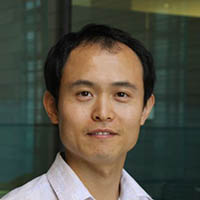Site Navigation:
Photogrammetry and 3D Computer Vision - Course year 2026

|
-
Feb. 13. The lecture notes on camera calibration are available, and you're highly encouraged to read them before the lectures.
-
Feb. 13. The example code of camera models are available here.
-
Feb. 13. The slides and lecture notes of today have been uploaded here.
Note: you must join a group to be able to access the assignments.
-
All news ...
|
About
Photogrammetry and 3D Computer Vision (3DV) aim at recovering the structure of real-world
objects/scenes from images. This course is about the theories, methodologies, and techniques of 3D computer
vision for the built environment. In the term of this course, you will learn the basic knowledge and
algorithms in 3D computer vision through a series of lectures, reading materials, lab exercises, and group
assignments.
Contents
The topics of this course cover the whole pipeline of reconstructing 3D models from images:
-
Cameras models and camera calibration: how a point from the real world gets projected onto the image
plane and how to recover the camera parameters from a set of observations;
-
Epipolar geometry: the geometric relations between 3D points and their image points; the constraints
between the image points;
- Image matching: define and match image features (SIFT) to establish correspondences between images;
- Structure from motion: recover/refine geometry and camera parameters from a set of images;
- Multi-view stereo for recovering dense geometry (e.g., point clouds) from images;
- Surface reconstruction: obtain 3D surface models of real-world objects from point clouds.
Goals
After finishing this course, you will have gained knowledge of 3D computer vision techniques and the skills
to apply them for recovering 3D geometry of real-world objects from images. Specifically, you will be able
to:
- apply linear algebra knowledge to implement basic 3D computer vision algorithms;
-
explain the main concepts in 3D computer vision (i.e., camera models, camera calibration, epipolar
constraints, fundamental matrix, image matching, triangulation, structure from motion, bundle
adjustment, multi-view stereo, and surface reconstruction);
-
evaluate methods for reconstructing smooth surfaces and piecewise planar objects, and choose applicable
methods to solve specific reconstruction problems;
- propose and implement solutions for reconstructing real-world buildings from images.
Assessment
The assessment of this course consists of three group assignments and the final written exam. The final
grade is based on the evaluation of both the assignments and the final exam, breaking down into:
-
group assignments (40%). All assignments have equal weight in the final grade.
-
final exam (60%). The final exam consists of multiple-choice questions and open
questions. Example questions will be given two weeks before the exam.
Pass or fail? Grading is done on a 10-point scale, and the final marks are rounded off
to the nearest full and half figures. To pass the course, all assignments and the final exam must be
graded greater or equal to 5.5, and a total of 5.75 or above is required to pass the course.
Repair and retake options. Any component of the assessment graded lower than 5.5 is
eligible for one more opportunity to retake (for the exam) or repair (for assignments). A repair is a
revision or addition to an existing assignment, and a successful repair will be assessed at a maximum of 6.0. A retake is an entirely new examination.
Prerequisites
-
Basic linear algebra and calculus. You should be comfortable with matrix-vector
operations and understanding concepts such as gradient.
-
Proficiency in C++ programming. All assignments will be in C++ (because of its good
performance). If you have a lot of programming experience but in a different language (e.g.,
Python/Matlab/Javascript) you will probably be fine. For those who are not familiar with C++, please
check Programming resources and tools.
Course logistics
-
Schedule: 2x 2h-session per week. See detailed schedule here.
-
Lectures: on campus. Check here for an
overview and the schedule of all the lectures.
-
Slides and lecture notes: will be posted
here shortly after each lecture.
-
Contact: we will also use this course webpage for announcements and the
Discord channel for all course-related questions. We
highly recommend raising questions on the Discord text channel, so others can also benefit from the
Q&A. For external inquiries, emergencies, or personal matters that you don't wish to put in a
private post, you can email Liangliang.
Coordinator/Teacher
Copyright @Liangliang Nan. 2021

